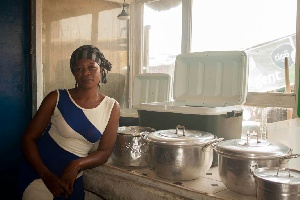Ghana has over years been confronted with massive migration of people, particularly young men and women mostly from poor communities in Northern part of the country to Accra and other major cities such as Kumasi, Takoradi and Tema in search of jobs and other economic opportunities.
These young migrants engage mostly in head-portage popularly known as “Kayayo” and other menial jobs such as domestic servitude and street trade to earn a living. Most of the girls migrate each passing day to the cities and other urban centres of the country to seek for greener pastures.
However, life turns out to be harder than they may have imagined. Like so many other young girls and women who migrate to Accra, their goal was simple: to enjoy a better quality of life and live in dignity. What they discovered was a whole different set of life challenges and safety concerns.
Azumi Mahami is a former Kayayo who migrated from Walewale – a small town and the capital of West Mamprusi district in the Northern Region of Ghana. She came to Accra in search of a job to get enough money to cater for her family back in the village. This was after Azumi had completed her JHS1 education. Her dad had passed on and her mother couldn’t further her education.
She moved down to Accra to live with her brother who was then married. But the maltreatment battered by her sister-in-law compelled Azumi to go back to her hometown and returned back to Accra in two weeks to live on the streets of Tema Station. Kayayo (Porter) became her business.
Azumi carried heavy loads for market women from Kantamanto, Tema Station, Makola, and Tudu to earn little money for a living. She slept on the streets of Tema Station where most of the Kayayies had settled, till she relocated to Sodom and Gomorrah when the construction of the main Tema Station Lorry Park began.
“Living in Sodom and Gomorrah was unpleasant for me. I didn’t have a kiosk on my own so I had to sleep in front of people’s shops after they had closed from work. My life was always at risk; there where reported cases of armed robbery, rape and prostitution”
According to Azumi, her dream of coming to Accra had always been at the back of her mind preventing her from involving into any negative practice. “The challenges that came my way rather pushed me to hit harder in life to attain a better living than to do something to disappoint my family”
Azumi was in the kayayo business for more than twelve years. During those times, she had sent money home to cater for her mother and her seven siblings in Walewale.
“I got tired with the Kayayo business, I couldn’t sleep at night neither was I getting the energy to always go the street to carry heavy loads. I bought some cooking utensils and shifted from kayayo to selling of cooked rice and stew. I moved around to sell the rice. God being on my side, it got to a point that I didn’t have to roam to sell, I got people coming to buy from where I cooked”.
As time went on, business started booming for Azumi, she bought a kiosk from one lady who decided to go back to her hometown. She expanded her rice business to a chop bar. She cooked all kinds of food ranging from fufu, banku, rice balls, tuo zaafi, among others.
For over four years that Azumi started operating her chop bar, she has built a house for her mother who stayed in her late father’s house with other 6 wives. She has also enrolled her other siblings in formal education.
Azumi’s chop bar located in Sodom and Gomorrah currently operates with six employees.
She however bemoans that, market has been very slow due to the demolishing exercise at Sodom and Gomorrah carried out by the Accra Metropolitan Assembly.
To her, getting enough money and moving back to Walewale to settle is her greatest wish.
Opinions of Sunday, 16 August 2015
Columnist: Motivate Ghana



















